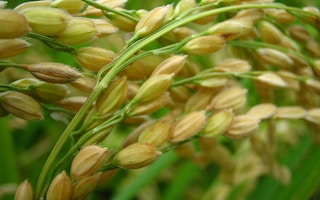Singapore last week became a major contributor to international efforts to ensure food security with a new commitment to the research and development (R&D) of new rice varieties.
In his opening address at last week’s International Conference on Asian Food Security (ICAFS 2011), Dr Mohamad Maliki bin Osman, senior parliament secretary for Singapore’s ministries of defence and national development said that the National Research Foundation (NRF) will invest US$8.2 million over five years in a new research partnership to improve rice cultivation in the face of rising food demand and deteriorating growing conditions.
Singapore’s Temasek Life Sciences Laboratory (TLL) and the National University of Singapore (NUS) will collaborate with the Philippines-based International Rice Research Institute (IRRI) on developing better rice farming methods and new varieties that are better adapted to changing conditions due to climate change.
IRRI’s Deputy Director General for Research Dr. Achim Dobermann said in a statement he was delighted to see Singapore stepping up as a regional leader in international rice research.
“We need to be thinking beyond national borders to help tackle food supply issues,” he added, “And Singapore is showing real leadership within Asia by doing just that.”
The project marks Singapore’s entry into the Global Rice Science Partnership (GRiSP), a project launched last year to pool the resources of about 900 organisations from around the world to discover new rice genes with a view to increasing crop yields. The project’s scientists will also seek ways to increase the staple’s tolerance to drought, disease and flooding. Started by the Consultative Group on International Agricultural Research (CGIAR), GRiSP is headed in Asia by IRRI.
IRRI predicts water scarcity will affect 15 to 20 million hectares of rice within 25 years, and that rice yields will also decline due to lack of land, nutrients, and labor.
Rice is a staple food for more than half of the world’s population. IRRI estimates the world needs to increase rice yields by 8 to 10 million tonnes each year to maintain a reliable and affordable supply. The GRiSP target is to raise crop yields enough to reduce the projected increases in the cost of rice globally over time, resulting in fewer malnourished people in the world’s poorest regions. According to IRRI’s website, the GRiSP initiative could lift 40 million Asians out of a malnourished state by 2020, a 7 per cent reduction in hunger in the region. By 2035, hunger in Asia could be reduced by 12 per cent.
Asia’s farmers produce about 600 million tonnes of rice annually using 140 million hectares of land.
Singapore, an urban nation of about five million people, does not produce any rice.
However, growing global concern about food security has increased international attention on staple foods such as rice.
Dr Maliki noted in his speech that global food crisis of 2007/2008, which sparked riots and demonstrations in multiple cities around the world, highlighted the need for countries to re-examine food security policies. He said the food shortages were the result of years of under-investment in agriculture combined with growing populations and new stresses from changing environmental conditions.
“Today, food security has been firmly placed on the agenda of key regional and multi-lateral fora,” he said, adding that multilateral talks on the effects of trade, finance and energy policies on food security were underway within Asean, the Asia-Pacific Economic Cooperation (APEC) and under the French presidency of the G20.
As a republic almost entirely dependent on food imports – more than 90 per cent of the country’s food is imported – the Singapore government has identified food security and price volatility as a key concern.
Dr Maliki said that Singapore addresses this concern domestically through measures such as diversifying food sources and supporting local farms, which primarily provide fish, leafy vegetables and fish, to increase productivity.
He noted that internationally and regionally, Singapore can make significant contributions to global food security through (R&D) in both the public and private sectors.
Existing research projects include work being done by a think tank called the S Rajaratnam School of International Studies Centre for Non-Traditional Security Studies, which provides research on Asian food security, a pilot project by the Agri-food and Veterinary Authority of Singapore (AVA) on urban farming, R&D from private laboratories such as Syngenta and Bayer CropScience, and the newly launched collaboration with IRRI.
Dr Naweed Naqvi of TLL, who will lead the rice research project alongside Professor Prakash Kumar from NUS, said in a statement, “Our collaboration with IRRI will help position Singapore as a strategic partner in regional and global food security. We will now be able to link the excellent research done here in Singapore to many other rice improvement activities worldwide.”

















